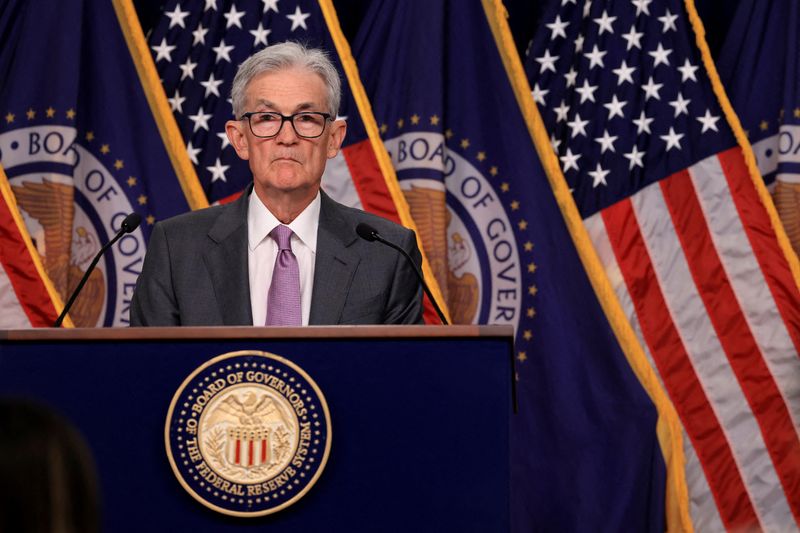By Michael S. Derby
(Reuters) – U.S. Federal Reserve Chair Jerome Powell said on Wednesday political considerations play no part in either near-term monetary policy deliberations or the central bank’s longer-run forecasting work.
“We don’t change anything in our approach to address other factors like the political calendar,” Powell said at a press conference that followed the most recent meeting of the central bank’s rate-setting Federal Open Market Committee. “I’ll say this too: We never use our tools to support or oppose a political party, a politician or any political outcome.”
Powell addressed the Fed’s intent to stay out of the political fray as the central considers a possible rate cut in September, less than two months before the November presidential election.
While the FOMC left rates steady and maintained its interest rate target range at between 5.25% and 5.5%, where its been for a year now, easing inflation data has almost certainly opened the door to a rate cut in the next few months. In his press conference Powell wouldn’t commit to an action but strongly suggested that if the data continues on its current path, a rate cut at the Fed’s next meeting on Sept. 17-18 was possible.
If the Fed cuts rates in September, it would likely set the central bank up for criticism from Republican presidential contender Donald Trump. When he was last in office, the former president was a sharp critic of the Fed and Powell. In a recent Bloomberg Businessweek interview, he said a pre-election rate cut is “something that they know they shouldn’t be doing,” presumably because easier borrowing conditions might favor his presumptive Democratic opponent, Kamala Harris.
Fed officials have consistently argued that politics do not bear on their monetary policy choices and Powell reiterated that point in his press conference, saying it’s the data alone that will make the call for when the Fed is able to cut interest rates.
“This is my fourth presidential election at the Fed,” Powell said, and with that experience, any monetary policy choice “will be based on the data, the outlook and balance of risks and not on anything else.”
FORECASTING FACTORS
Powell also said that potential changes in the nation’s political direction are not something central bankers will take on board as part of their longer-range forecasts, which are made public on a quarterly basis, with the next update due in September.
“We absolutely do not do that,” Powell said, noting the inherent uncertainty in knowing who might win a given election.
While it’s possible to “run simple simulations of different potential policies” a government might pursue, changing actual Fed policy to reflect these types of shifts is “a line we would never cross,” Powell said, adding “we don’t want to be involved in politics in any way, so we wouldn’t do that.”
The question of whether the Fed should factor a change in administration or control of Congress into its forecasts and policy outlook is being driven by Trump’s economic agenda. Experts across ideological stripes believe the former president’s pro-tariff, anti-immigration and tax-cut agenda means inflation would again rise.
For some, those risks might mean the Fed needs to rethink some of its longer-run hopes for rate cuts and lower inflation. Some former Fed officials have even argued in favor of factoring that outlook in, although current officials have rejected that view.

Derek Tang, an analyst at LHMeyer, a forecasting firm, is skeptical the Fed can shrug off politics’ impact on forecasts.
“Powell acknowledged that they run alternative scenarios but then denied that it filters through to their forecasts,” Tang said. “This does not seem believable given that the 2025, 2026, (and, in September, 2027) macro projections and dots are a crucial piece of their forward guidance,” and for those forecasts to be taken seriously, Fed watchers would need to know the central bank is thinking about how shifts in government policy will affect the economy, he said.